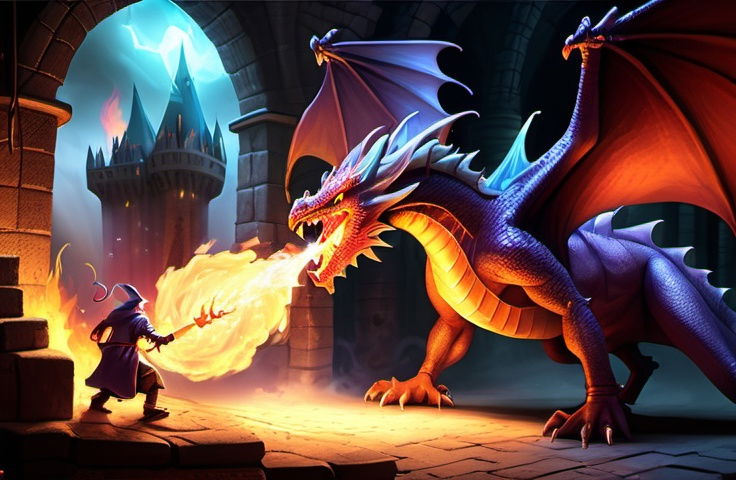New research has found that playing Dungeons and Dragons could be beneficial for people with autism by providing a safe space to engage in social interactions away from some of the challenges they face in their daily lives.
Previous research showed positive mental health benefits for those playing the immersive role-playing game (often shortened to D&D), but this is the first study to focus on the potential social, health, and quality of life benefits for people with autism.
“There are many myths and misconceptions about autism, with some of the biggest suggesting that those with it aren’t socially motivated or don’t have any imagination,” said Dr. Gray Atherton, Lecturer in Psychology at the University of Plymouth and the study’s lead author in a press release. “Dungeons and Dragons goes against all that, centering around working together in a team, all of which takes place in a completely imaginary environment.”
Previous Research Showed the Benefits of Playing Dungeons and Dragons and other Board Games
In July, The Debrief covered a study showing the potential mental health benefits of playing Dungeons and Dragons. According to that study, D&D players experienced positive mental health correlations in escapism, exploration of self, creative expression, social support, and routine. The authors of that particular study said that these correlations translated to an overall better mental health profile, indicating that participating in the game had a range of possible benefits. Still, that study did not specifically look at the potential benefits for people with autism.
In this latest study, Dr. Atherton and colleagues noted that a previous study had found that people with autism enjoyed many types of board games “because they took the pressure off the uncertainty around meeting and interacting with people, removing the need for small talk.” According to the study authors, reading social cues and navigating social situations has often been cited as one of the challenges facing this community, leading to potential negative perceptions about them.
“Autism comes with several stigmas, and that can lead to people being met with judgment or disdain,” explained Dr. Liam Cross, a Lecturer in Psychology in Plymouth and the study’s senior author. According to Cross, these types of stigmas and negative perceptions often occur “because people have a picture in their minds of how a person with autism should behave.” He explains that this situation exists because those inaccurate perceptions are based on “neurotypical experiences.”
As a result, the researcher says that this situation can cause people with autism to withdraw from social situations or even avoid them entirely. At the same time, the parents of younger people with autism worry that their children can disappear into fictional worlds to escape the judgment of others.
“We also hear from lots of families who have concerns about whether teenagers with autism are spending too much time playing things like video games,” Dr. Atherton explained.
Players Experienced “A Sense of Innate Kinship” With Their Fellow D & D Adventurers
Curious if the benefits of playing interactive board games and a penchant for fantasy might be used to help these folks better navigate or even thrive in social situations, the researchers decided to test the reactions to people with autism playing Dungeons and Dragons.
According to the published study, volunteers with autism were initially divided into small groups. Each group had an assigned dungeon master, meaning someone who guided the volunteers on their D&D quests. Those sessions took place over six weeks.
At the conclusion of these fictional adventures, the volunteers were interviewed individually to measure their overall experience. Specifically, the researchers asked them “about the ways they felt their autism might have interacted with their experiences and, in turn, whether taking part in the game impacted their lives.”
In those interviews, the volunteers first spoke about their overall desires and motivations, especially regarding social situations and the challenges they faced in such situations. At the top of the list was the commonly reported experience that those desires “were often in direct conflict” with their actual experiences. The study subjects said this resulted in them hiding or otherwise attempting to “mask” their autism from others.
However, after playing D & D, the study volunteers reported experiencing entirely new feelings and experiences. For example, many of the study participants told the researchers that playing D & D, which, by its nature, takes place in a fictional, fantasy environment, provided them with an unusually friendly environment. As a result, they said that they felt safer being themselves. They also reported that they very quickly felt “a sense of innate kinship” with others taking part in the adventure, which was not usually present in everyday social situations.
“Understanding common issues linked to activities inside and outside of the game allowed them to relax without feeling pressure to act in a certain way,” explains the press release announcing the study, “and as a result, they felt included in – and able to better contribute to – the group’s interactions.”
Some Benefits Lasted Beyond Six Week Trial
According to the researchers, one of the more unexpected responses came when they conducted follow-up communications with the study volunteers. Specifically, many of the respondents said they were motivated to take some of the traits from their fictional character “outside of the game,” which made them feel differently about themselves in a positive way.
“Those taking part in our study saw the game as a breath of fresh air, a chance to take on a different persona and share experiences outside of an often-challenging reality,” Dr. Atherton explained. “That sense of escapism made them feel incredibly comfortable, and many of them said they were now trying to apply aspects of it in their daily lives.”
While the study was the first to look for potential benefits of playing Dungeons and Dragons for people with autism, especially in terms of social benefits, the researchers believe their work can offer families and medical professionals who support this community a new tool to help them learn to navigate social situations and improve their overall sense of confidence and self-worth. According to the release, this includes helping people with autism “find their inner hero.”
“Our studies have shown that there are everyday games and hobbies that autistic people do not simply enjoy but also gain confidence and other skills from,” said Dr. Cross. “It might not be the case for everyone with autism, but our work suggests it can enable people to have positive experiences that are worth celebrating.”
The study “A critical hit: Dungeons and Dragons as a buff for autistic people” was published in the scientific journal Autism.
Christopher Plain is a Science Fiction and Fantasy novelist and Head Science Writer at The Debrief. Follow and connect with him on X, learn about his books at plainfiction.com, or email him directly at christopher@thedebrief.org.

